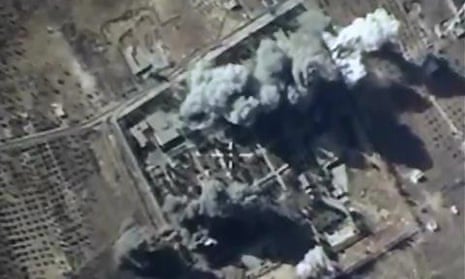The EU has urged Russia to halt its military intervention in Syria, warning that it risks prolonging the four-and-a-half-year conflict and undermining a political process to end it – despite profound disagreement on how to achieve that.
EU foreign ministers meeting in Luxembourg on Monday said the Russian attacks were of “deep concern and must cease immediately”. Federica Mogherini, the union’s foreign policy chief, called the Russian intervention a “gamechanger” that has “some very worrying elements”.
For the first time, ministers also called for the protection of civilians to be an international priority. President Bashar al-Assad bore the greatest responsibility for the 250,000 dead, they said, linking “the systematic targeting of civilians by the regime” to “mass displacements and recruitment to and the flourishing of terrorist groups in Syria”.
The EU statement, which diplomats said was subject to prolonged wrangling, is likely to be used by British Labour MPs who are demanding UK and western support for a no-fly zone in Syria to protect refugees, even if Russia, as it has threatened, vetoes a UN resolution. The recent Labour party conference agreed to support safe zones so long as they are authorised under chapter 7 of the UN charter.
In recent days, a flurry of diplomatic activity has focused on the Russian airstrikes, which Moscow says are targeting Islamic State, though rebels on the ground, Nato and the US have said the strikes are in fact hitting non-jihadi anti-Assad opposition groups far more extensively.
Russia’s defence ministry said its planes had carried out 55 sorties in Syria in the past 24 hours and hit 53 Isis targets.
Philip Hammond, the British foreign secretary, repeated on Monday that Assad could not be part of a long-term solution but said it was possible to “be flexible” on the manner and timing of his departure. This divisive issue was not mentioned in the EU statement, which said only that the Syrian leader could not be a partner in the US-led campaign against Isis.
But Spain’s foreign minister, José Manuel García-Margallo, reiterated Madrid’s view that the west would need to negotiate with Assad to stabilise Syria. “Negotiations are done between enemies,” he said. France, which is investigating Assad for war crimes, again insisted that he must quit as soon as possible.
EU diplomats have admitted privately that the Russian intervention has in effect frozen efforts by the UN envoy to Syria, Staffan de Mistura, as well as complicating plans to create a “contact group” of key states to find a way out of the impasse. De Mistura is to hold talks in Moscow on Tuesday before going on to Washington in the hope of encouraging US-Russian agreement.
Nato’s secretary general, Jens Stoltenberg, said: “Russia should play a constructive role in the fight against [Isis]. To support the Assad regime is not constructive. This is only prolonging the war in Syria.”

Meanwhile, Sergei Lavrov, the Russian foreign minister, said there had been progress in talks between president Vladimir Putin and the Saudi deputy crown prince and defence minister, Mohammed bin Salman, on the sidelines of the Russian Grand Prix in Sochi at the weekend.
Lavrov said the Russian operation was aimed at Isis and intended to “prevent … the formation of a terrorist caliphate”. But a Saudi source warned that the Russian intervention would have “dangerous consequences”. The Saudis have signalled that they are stepping up arms supplies to anti-Assad fighters.
The Turkish prime minister said Ankara would hold talks with Russia and Iran – Assad’s staunchest allies – on a political solution in Syria but would not take a stance that “legitimises the Syrian regime”. Ahmet Davutoğlu told NTV that Russian airstrikes in Idlib and Aleppo could cause a further influx of refugees.
The Russian bombing has been accompanied by a significant advance by Syrian government forces, supported by thousands of Lebanese Hezbollah fighters and hundreds of Iranian-backed militiamen.
In a related development, a Kurdish militia that has been fighting Isis in Syria with the support of US-led airstrikes has joined forces with Arab groups in an alliance that may be a prelude to an attack on the jihadists’ base of operations in Raqqa.
The alliance, the Democratic Forces of Syria, includes the Kurdish YPG militia and Syrian Arab groups, some of which fought alongside it in a campaign that drove Isis from large parts of northern Syria this year. The Arab groups in the alliance are operating under the name the Syrian Arab Coalition”, which the US has pledged to support.
The US said it carried out an ammunition airdrop in northern Syria for Syrian Arab groups battling Islamic State on Sunday, as Washington shifts its focus away from a failed program to train a new rebel force. The US military did not name the individual groups that received the small arms ammunition, but said their leaders had been screened by the US.
Reuters contributed to this report.

Comments (…)
Sign in or create your Guardian account to join the discussion